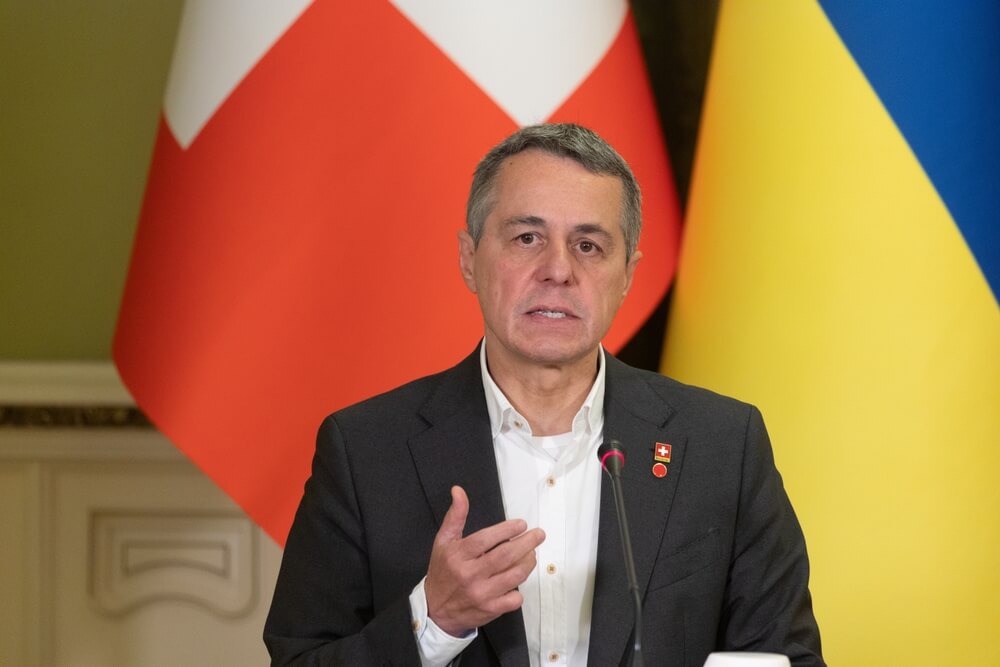Switzerland will not be deterred by Russia's latest rejection of its initiative for a global peace conference on Ukraine.
Organising the summit on establishing peace between Russia and Ukraine has faced numerous challenges since January when Switzerland accepted Kyiv’s idea.
On the other hand, the potential of the Swiss plan is the greatest so far and has a chance of success, more than all previous attempts by different actors.
Last Wednesday, Moscow again rejected the Swiss initiative for a peace summit, partly because of a lack of confidence in the mediator.
"Switzerland can hardly serve as a platform for various peacekeeping efforts since this presupposes a neutral status, which Bern has lost”, said Maria Zakharova, Russian Foreign Ministry Spokeswoman.
Is Moscow softening its position?
However, her emphasis on Switzerland's ineligibility as conference organiser might appear like a softening of Russia's position. Only 3 weeks ago, another Moscow spokesperson, Dmitry Peskov, described the Swiss idea as "bizarre" without further explanation.
Switzerland wants to step out of the current format of the search for a peace solution in Ukraine, where numerous countries (83) have participated in several times, the last time in Davos in January.
But despite the global coverage, the talks have been taking place below leadership level, something Switzerland wants to change.
Switzerland is patient regarding Russia’s participation in the talks it has initiated, regardless of its persistent opposition
The peace talks so far have not led to any breakthrough and are slowly turning into a debate club, which the government in Bern understood as a motive for action.
Switzerland is patient regarding Russia’s participation in the talks it has initiated, regardless of its persistent opposition.
"We should find a way to bring Russia into peace discussions. There will be no peace if Russia cannot have its say”, said Ignazio Cassis, head of Swiss diplomacy, last January, and his position has not changed until now.
Does Switzerland have room to ease sanctions?
However, there might be room for Russia's refusal to become less persistent. Moscow's insistence that Switzerland has lost its long-cherished neutrality in international relations by siding with the Europeans and imposing sanctions on Russia suggests that Russia's consent to a peace summit might be conditional on easing Swiss sanctions.
So far, they have been equally severe as the EU's, freezing about $9 billion of the Russian central bank's funds in Swiss institutions and many more funds and assets belonging to sanctioned Russians and their enterprises.
On top of that, the Swiss parliament gave the go-ahead last week for the government to find an international legal way to use Russia's frozen money to finance reconstruction and reparations in Ukraine.
The Kremlin would be interested in concessions, given the Russian economy's need to stem its prolonged bleeding and the need for financial injections
Switzerland might be able to include Moscow in peace negotiations if the government deems that the political benefit of intervening in achieving peace in Ukraine outweighs the staunch solidarity with European sanctions.
There is no doubt that the Kremlin would be interested in such concessions, given the Russian economy's need to stem its prolonged bleeding and the need for financial injections.
The Swiss reliefs would not be "bizarre" at all, given that, according to estimates, as much as a third of the total Russian state and private deposits in Switzerland have been frozen in its banks.
Taking a detour to a peace conference
Switzerland, aware that Russia will not readily agree to participate in the peace talks, at least not within the structure and platform favoured by Bern, has attempted to obtain its approval through several means.
At the beginning of February in Beijing, Ignazio Cassis asked for China's support for his initiative, considering that it is a crucial Russian partner having the authority to influence the Kremlin's decisions and even to direct them.
At the time, he could not assess whether China agreed to cooperate, saying it was about "a very high-level conference and that they could not expect an immediate answer”.
However, this speaks of the patience of Swiss diplomacy, which, on the one hand, does not risk exposing China to any pressure and, on the other hand, wants to secure other significant voices that would help the conference succeed.
 Swiss foreign minister Ignazio Cassis asked for China's support for his initiative, considering that it is a crucial Russian partner having the authority to influence the Kremlin's decisions and even to direct them
Swiss foreign minister Ignazio Cassis asked for China's support for his initiative, considering that it is a crucial Russian partner having the authority to influence the Kremlin's decisions and even to direct them
Swiss officials clearly emphasised that the detour goes through neutral and influential governments, particularly those that still maintain a partnership with Russia despite its invasion of Ukraine.
The idea is for those countries, notably the BRICS members, to exert enough pressure on Moscow and leave it without room for manoeuvring and avoiding peace talks.
Perhaps the most pressing issue for the Swiss plan is its timing, given Bern's expectations that the peace summit could take place as early as this summer.
It is unrealistic to expect that Vladimir Putin would engage in any serious peace talks before the presidential elections in the US in November.
Putin will most likely not make any decisions regarding Ukraine until the US elections, as he hopes that Donald Trump's return to the White House will significantly ease Russia's international isolation.
This does not rule out the chance that Russia (in some form) will still agree to negotiations by then if it is under intense pressure from its allies, particularly China, to join.
The Swiss initiative has the potential to develop into the most significant peace process to date, given that it has already invested its entire and quite substantial international credibility.